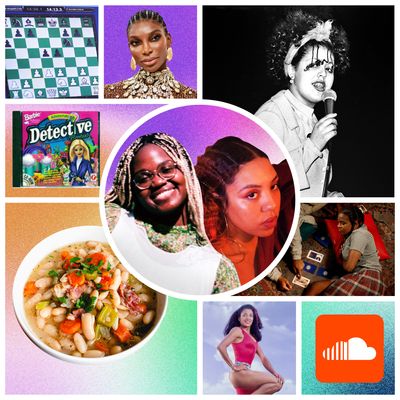
If you’re a millennial, it was probably Mavis Beacon — of “Mavis Beacon Teaches Typing,” which has sold over 10 million copies — who taught you how to type. But despite the software’s ubiquity, Renée L’Espérance, the Haiti-born model we all know as Mavis Beacon, was only ever paid $500 for her likeness and hasn’t been seen or heard from since. The documentary Seeking Mavis Beacon follows director Jazmin Jones and artist Olivia McKayla Ross on a “DIY detective journey” to recover the details of this near-forgotten chapter of Black and internet histories. (Following its Sundance debut earlier this year, the documentary will be premiering at New York’s IFC Center on August 30 and in select cities in September.)
The film positions the viewer as a third detective, creating the clues-filled desktops of Jones and Ross for us to riffle through along with them. These desktops look familiar: They are cluttered with memes and screenshots like your own probably. The memes and TikToks and other forms of internet ephemera appear throughout the film to connect all the dots. In their search for L’Espérance, Jones and Ross find questions that refuse to be answered, and it seems at times that, perhaps, Mavis Beacon doesn’t want to be found. Within that negative space, the filmmakers imagine what might be or could have been, and ask themselves how far they are willing to go to write the definitive story of this forgotten chapter of internet history.
You spend a lot of time online, and you have the skill set to make your time online serve you instead of drain you. What does the process look like for you to discover a favorite Instagram account, a meme, an artist, a recipe, or creators that you like?
Olivia McKayla Ross: So, I’m really curious to hear Jazz’s response to this, because mine, unfortunately, is the most, and I don’t know the audience at the Cut, but I feel like my answer to this is the most basic-ass, New York–ass, intersection-of-art-and-technology-ass response, because I’m going to say: Are.na. It’s basically my second home page. I start there when I don’t know what I want to be doing on my computer.
My relationship to being online is very much like scuba diving or archaeology. I keep plugging this film way harder than I ever thought, but it’s The Last Angel of History — I’m like the data thief in the movie. I’m on the Wayback Machine all the time. I’m also on Mastodon.
Jazmin Jones: I’m a big believer in training your algorithm. I will say I’m not interested if I’m not interested. If you’re gonna know me, know me well.
In terms of shopping and stuff, it’s been a weird process even getting dressed to promote the film. We’re thrifting and reaching out to homies who are designers. I’m into Dwan Jakari and Telfar.
Ross: I’m also very into online radio, like NTS, but I like connecting to radio stations in other countries, like Radio Garden. If I like a song, I look to see what the name is. And frankly, I’m really trying to leave Spotify by 2025. I’m downloading everything; I’m tired of renting music.
Jones: A quarter of the music that we licensed for the score came through SoundCloud. I listen to SoundCloud heavy. As a maker, I feel like that puts you in direct connection with artists, and we have a lot of, like, friends who are amazing DJs, and I can’t always see their sets and stuff, so I like playlists. So, for me, I’ve spent a lot of time training my SoundCloud algorithm, and that is so worthwhile.
Ross: People should learn to pirate again. I don’t know if that’s legal for me to say, but we’re losing recipes! The fact that Gen Z doesn’t know how to download a damn movie is disgraceful.
The version of the internet depicted in the doc is super-fun, chaotic, and personal. It’s nostalgic in a way we’ve never really seen before on film. What are some Instagram pages you totally love and are keeping up with?
Jones: I have a million screenshots from Zeba Blay’s Instagram on my desktop. Also, @niggaslovecomputers. It’s a sleeper hit, and it’s literally just archival images of, like, Black folks on computers. It is the best of my favorites. Also love the @nolly.babes Instagram account. I mean, their content archive is amazing, the fashion.
How did each of you prepare for this project? What did the syllabus look like?
Ross: We gave each other homework.
Jones: Olivia gave me way more homework. I was looking to her as a theorist that I was referencing when we started this collaboration. She started off by telling me about Shirkers and Morvern Callar. I’m still working through her recommendations. Also, shout-out to Drylongso.
Ross: When we were thinking about the critical fabulation of it all, we revisited Saidiya Hartman’s Wayward Lives, which led to us interviewing Shola von Reinhold for the film. Her book Lote was recommended to me by a friend, and my entire friend group got super-obsessed with it. It’s basically about this young, queer Black woman who’s a volunteer archivist, and she comes across the photograph of this very fabulous-looking Black modernist poet who was in the same social circles as the Bright Young Things. And she becomes obsessed with the picture of this poet and adds it to this list of her “transfictions,” as she calls it. And that obsession leads her to applying to an artist residency that is in the town that this poet lived and worked in for a bit, and then it evolves into a wider, larger, weirder story.
Do you have any rituals you use to ground yourself before you work?
Ross: I’m a really big perfume-head. I’m a Scent Bar regular. I’m real annoying and I take a free sample every time I go. I was wearing Poudrextase by Marlou for a long time, and then TikTok blew it up. It smells like makeup and sweaty ballerina tights. But it was so embarrassing to get it at Scent Bar after I finished my first bottle and the person behind the counter said: “Are you here from that TikTok?” I wanted to sink into the floor.
Jones: I am the kind of millennial who watches lots of YouTube content. I start my day with daily affirmations and seeing what I’m grateful for and what my priorities and intentions are. And I also have a habit tracker in my journal, which I told someone about recently, and they looked at me like I was fucking insane. I like using different highlighters like the really cool girl in school who took the best notes. I cosplay being that girl in school who had a perfect notebook.
Is there anything you would never watch?
Jones: Woody Allen films. I miss every other Woody Allen movie, and I’m happy. That’s a good life for me. I’m never going to get FOMO. And I get FOMO a lot. I’m a Gemini, so I often feel left out with any cultural phenomenon, but not Woody.
Ross: I don’t know if this is maybe too hot of a take, and I don’t even know if I’m going to stick to this. But if there’s a Euphoria season three, I’m not watching that. But I love Hunter Schafer.
In this doc, you get a chance to meet a lot of people you admire — and literally sit down for tea with — like Shola von Reinhold. Which other celebrities or icons would you invite to a dinner party, dead or alive?
Ross: I recently have reignited my obsession with the Negritude movement and the Harlem Renaissance — I’d invite the Nardal sisters. I just want to invite them all to tea, all Pan-African communist baddies. I would like to gather them all at a table. I think we should chat.
Jones: I would start with the Olympian Flo-Jo, who passed away, with the nails and who was a record-breaking baddie. I’m obviously going to invite every version of Mavis Beacon — they all are celebrities to me. Also, Poly Styrene from X-Ray Spex, first Black femme punk singer of a band … And Michaela Coel! I’m hoping we get to come to the party, too, and we’re not just planning it.
Let’s talk about not-work: Do you play any games?
Jones: Our designer for our poster recommended this really cute website, infinitemac.org, and it’s an emulator where you can play different games. My parents did not let me play video games, and you can tell when you watch this film: Like, girl, it was educational software.
Ross: I’m big on chess. I be playing chess.com. Am I good at chess? No. But I have the shortcut on my desktop. Also, since my childhood, I’ve really been into choose-your-own-adventure games and a lot of Theresa Duncan’s CD-ROM games. (Shout-out to Rhizome for how many of those that they’ve preserved.)
Jones: Detective Barbie! That was a choose-your-own-adventure game that really influenced everything around this film.
Ross: We are making a typing game where people can compete to see who has the fastest typing scale, both hand-wise and for thumb typing on your phone.
Jones: It’s really cute, and as you’re typing, you can type in affirmations, so it also has subconscious benefits.
What about playlists? Any good ones out there you soundtrack your life to?
Jones: Helado Negro puts out SoundCloud playlists, and they are amazing. You can’t go wrong if you have a date over and you want to seem cool and cultured and like you’re not trying too hard; any Helado Negro playlist will get you through.
Ross: I’m turning 23 at the end of this month (August). And I think that for the first time in my life, I’m grown enough to appreciate Sade to the fullest.
What was the last thing you cooked for dinner?
Ross: It was honestly a very New York Times Cooking–ass recipe that wasn’t actually from the Times. But it was one of those lemony, garlicky, white-bean meals. White beans, pasta, zucchini, and I added yogurt, and it was really good.
Jones: White beans are cool. That’s what cool girls are eating.
This interview has been edited and condensed for clarity.
More From This Series
- What’s in This Creative Director’s Secret Sauce?
- Ravyn Lenae Jams Out to Bossa Nova in Her Free Time
- Frances Tiafoe Pregames Tennis Matches by Listening to Nipsey Hussle





